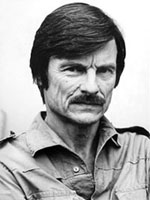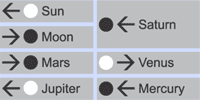The celebrity gallery - Andrei Tarkovsky
 |
 |
Time of birth: 4.4.1932 15:23:00 Time zone: +4 |
| Andrei Tarkovsky (1932-1986) — a Russian film director, People's Artist of Russia, who directed such famous movies as "Ivan's Childhood", "Andrei Rublev", "Solaris", "The Mirror", "Stalker" and other. | ||
Interesting facts
The childhood, adolescence and youth (The White Sun)
According to his classmates, Andrei Tarkovsky had a feeling of chosenness and aristocratism when he was a child. Andrei attended school, studied painting, music, read a lot. However, any of his youth interests quickly vanished, and his mother often reproached his son for the dispersion. After graduating from the art school, Tarkovsky entered the Arabic department of the Middle East Faculty of the Moscow Institute of Oriental Studies. Then he left the studies and spent summer in geological expedition in Siberia. Having returned to Moscow and passed the entrance exams, Andrei Tarkovsky was accepted into the director's department of Gerasimov Institute of Cinematography, the workshop of Mikhail Romm.
The mission (The White Jupiter)
Tarkovsky believed that the true artist and genius even more are the slaves of the gift, which they are entitled. "I have never understood what movie is, said the outstanding director, I felt that you can touch some spiritual substance with a movie". He was opposed to the belief that the movie is supposed to be only entertaining, thought he considered it to be a powerful potential of the impact on the human soul. The cinema was the way to explore the human soul for Andrei.
The occupation (The Black Mars, the Black Mercury)
In a sense, Andrei Tarkovsky is referred to the discoveries in the art. His whimsical cinematic language makes his work difficult to grasp for the mass audience. The slow rhythm of his movies often almost hypnotically forces to plunge into them as into a stream of consciousness without the beginning or the end.
An actor was a personality which expresses his own ideas for Andrei Tarkovsky. That is why he had to hide his acting nature. Tarkovsky was ok with actors who obeyed him. In this regard, Anatoly Solonitsyn who played the part of Rublev was perfect. He was very delicate and sensitive actor, devoted to Tarkovsky with his whole being. No wonder the outstanding director shot him in all his films.
The love and the family (The Black Saturn, the Black Moon, the White Venus)
His attitude towards women Tarkovsky expressed in these words: "The woman is a symbol of love, and love, in my opinion, in all senses is one of the highest things a person can have on the Earth..." His wife Larisa P. Kizilova became a kind of shield for Tarkovsky, or if you like, a filter between the fragile psyche of her husband and unnecessary human diversity. Larisa guaranteed the protection, which apparently lacked the nerve, reflective Tarkovsky. Her love for her husband was not verbal and sentimental, but active. She cooked the food, washed the clothes, organized the clandestine film showings of the banned husband’s movies to the influential cultural personalities, led the financial policy of the family, was his personal secretary, and in general he gave her almost all of his organizational affairs, except for those that were directly related to the creative process.
The temper (The White Venus, the Black Saturn)
Closed, often self-absorbed, prone to self-criticism, Andrei Tarkovsky spoke about himself: "I think I do not love myself enough. He who loves himself not enough, does not know the purpose of personal existence, in my opinion, he cannot love others. And I think that I do not love myself enough and therefore I do not love others enough. I have one very serious drawback – the intolerance. I still want to get rid of it, but I'm afraid that I cannot do it..."
The relations with the government (The Black Saturn, the White Sun)
They allowed Tarkovsky to make only five movies at home for over then twenty years of work. The release of each of them was accompanied by humiliating bullying - endless quibbling, amendments, the organization of the baiting in the mass media, political accusations. Deep down Tarkovsky badly reacted to criticism from the ideologues of the "culture". Trying to isolate himself from their attacks, the director said in one of his interviews: "We have no criticism". In spite of everything, Tarkovsky was always deeply attached to his country: "I love my country, and have no idea how it is possible to live somewhere else for a long period of time. I am very fond of the country-side where I lived and which I call my homeland ", he said. However, been convinced that his work will never be properly evaluated in the USSR, Andrei Tarkovsky made a difficult decision for himself and stayed abroad. The Union declared Andrei Tarkovsky a traitor, stopped the distribution of his movies and refused to let his son and wife to join him abroad in response. The separation from family and home influenced his health greatly and caused the cut-off to a large extent. These motifs are clearly seen in director’s works. Thus, in the drama "Nostalgia", which Tarkovsky shot abroad, he talked about a Russian poet who died in Italy from the homesickness.
The death (The Black Moon, the Black Mars)
From a medical perspective, Tarkovsky died of smoking and throat cancer. He was only 51 years old. He was a man with a unique point of view, "a man who saw the angel", as the inscription on his tomb sais.